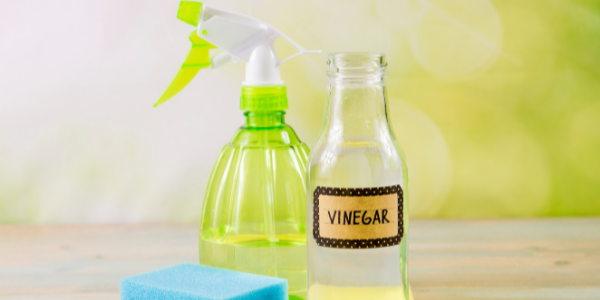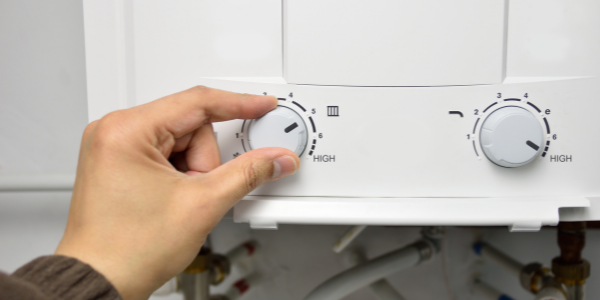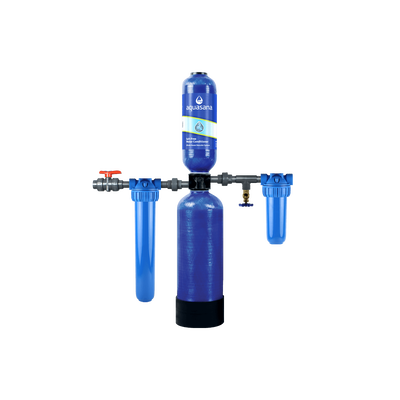Now that you know why hard water is a problem and the signs to recognize, the next step is to get rid of it. Here are a few hard water treatment options you can try out in your home.
5 hard water solutions for your home
1. Vinegar
Since the majority of hard water is calcium, it is highly reactive with acids like vinegar.
Place small fixtures that are covered in buildup into a bowl of hot, all-natural vinegar to dissolve the calcium deposit in about an hour. Another common hard water treatment recommendation for white film and spot problems on your appliances is using distilled vinegar. This will kill mold, bacteria, germs, and help clean dishware through regular wash cycles.
You may also notice a build-up of soap scum from hard water that vinegar can help get rid of. A simple rinsing with 1-part apple cider vinegar and 3-parts filtered water will do the trick.

2. Lower your water temperature
Not many people realize that running hot water through the hot water heater contributes to hard water stains and mineral buildup. This is due to the mineral precipitation process that takes place in the hottest part of the plumbing system. Over time, the hot water heater will accumulate scale from hard water buildup. Reducing the temperature of the heater will help delay the accumulation.
It is also important to flush the heater every so often to keep sediment from clogging up the fixture. In areas with hard water, this is especially problematic as it contributes to the amount of time it takes for your hot water heater to accumulate unnecessary junk at the bottom of the tank.

3. Rinse aid
Ever notice with hard water, you usually have to use extra soap for it to foam? This is because soap molecules are negatively charged on one end to help the molecule dissolve in water.
The other end of the molecule works to keep oil particles suspended in the water. Hard water works against the molecule because it contains positively charged calcium atoms. The two form a bond with no charge, rendering the soap molecule unable to dissolve.
To help get rid of hard water deposits on dishes and glassware, use a product similar to Lemi-Shine. Products like this work to treat years of hard water buildup, stains, and film. Products that are specifically formulated for hard water are made to withstand the positive charge of the calcium atoms so that soap can be rinsed off easily.

4. Appliance cleaners
As mentioned above, it is important to treat hard water buildup on appliances. This rule applies to pipe systems as well. Over time, calcified buildup becomes hard to remove. We recommend cleaning pipes and appliances regularly to keep from having to replace them too soon with simple appliance cleaning solutions that are available from many brands. These solutions include cleaners that are acidic, abrasive, chlorine-based and more to help with hard water problems.
As mentioned above, vinegar is an inexpensive substitute for some more expensive packaged appliance cleaners. For smaller appliances such as coffee makers, run two cups of strong white vinegar water through them on a regular basis to help prevent hard water buildup. This will ensure that it’s being cleaned thoroughly in areas that are hard to reach and will keep tea and coffee tasting great while lengthening the lifespan of the appliance.

5. Aquasana Water Softeners or Conditioners
Water softeners and conditioners provide comprehensive protection against hard water throughout your home. Both systems connect to your main water line so they can address hard water at the source, but they work in different ways and have their own pros and cons.
Water softeners use a process called ion exchange to remove hard water minerals from your tap water, while water conditioners use a process called template assisted crystalization (TAC) to dissolve excess minerals into microscopic crystals that don't build up over time. Softeners are generally cheaper and more powerful which make them ideal if you have water with a high hardness level, but require more maintenance due to the use of salt pellets that need to be replaced regularly. They also use electricity and generate wastewater which makes them less eco-friendly than water conditioners. Water conditioners don't use salt, electricity, or generate wastewater which makes them lower maintenance and more eco-friendly, although they're not as powerful as softeners and tend to cost more.
Aquasana offers both types of systems to suit your preferences. Our SimplySoft® Grain Softeners are available in 40k and 60k capacities to suit homes of all sizes, and are IAPMO certified to NSF/ANSI Standard 44 for the reduction of hardness while using 50% less salt and generating 28% less wastewater than traditional softeners. Alternatively, our Salt-Free Water Conditioner can protect your home against hard water without using salt and has a lifespan of up to 1,000,000 gallons or 10 years.
Which hard water treatment solution should you use?
We outlined several options to get rid of hard water problems in your home, but the one you should use depends on the severity of your issues. If you only have slightly hard water some of the signs may barely be noticeable so you could try some of the easy fixes like vinegar or hard water cleaning products. If your water is moderately hard or above, you should consider investing in a descaler to ensure hard water doesn’t damage your home’s plumbing system.
We recommend our SimplySoft® Grain Softeners or Salt-Free Water Conditioner to address hard water at the source and provide whole home protection. For questions about how these products can help get rid of hard water, check out the product pages for more information or contact us!
WHOLE HOUSE WATER SOFTENERS
SimplySoft® 40,000 Grain Softener
Reduces minerals that cause hard water, providing softer, scale-free water from every tap in your home.
.png)

